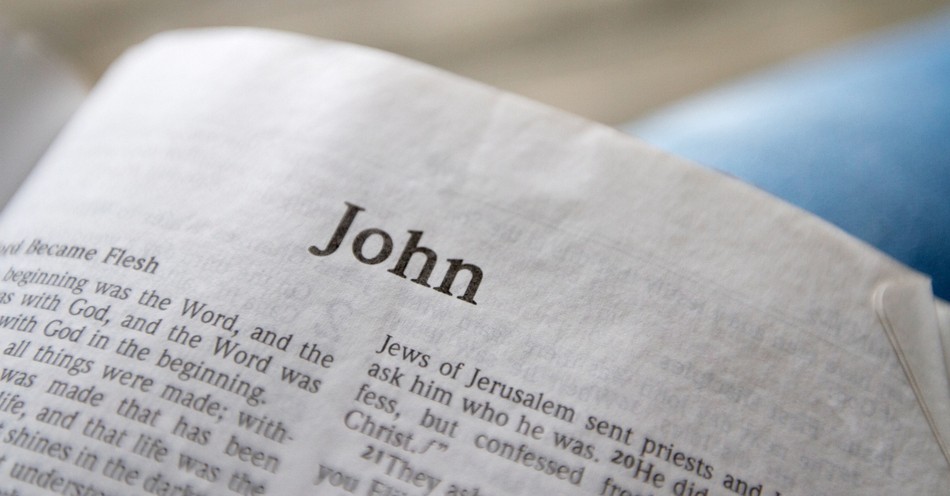"In the beginning was the Word, and the Word was with God, and the Word was God” (John 1:1).
The Gospel of John opens with one of the most powerful lines ever written. But what does this verse mean and how did we come to understand it?
What Does 'In the Beginning Was the Word' Mean?
Very simply, but profoundly, John explains through this passage that Jesus has always existed with God and in fact, is God. Although Jesus was born at a certain time in a certain place through a certain virgin named Mary, that was His incarnation, or His embodiment in human flesh, He has always existed.
Our God is a God who speaks, communicates, seeks relationship. This stands in sharp contrast to wood, stone, or gold idols we may fashion out of our own imaginations and with our own hands. Inanimate idols cannot communicate, hear, speak, or relate. God has done so since before time and all that He desires to communicate He does through creation (which was done through Jesus, the Word), through the written Word, the Bible, which prophecies and testifies in its entirety to Jesus, and finally, through the living Word, Jesus in the flesh. The author of Hebrews introduces His book with these words, “In the past God spoke to our ancestors through the prophets at many times and in various ways, but in these last days he has spoken to us by his Son, whom he appointed heir of all things, and through whom also he made the universe” Hebrews 1:1-2 NIV.
Jesus is, indeed, a historical person. We know when He was born, where He lived, where He died, and where He was resurrected. But, Jesus, being God, is also eternal, the Alpha and the Omega, the first and the last. He is unique in this and because of His nature, stands apart from any other religious figure or prophet the world has ever known.
John 1: 'The Word Became Flesh'
"In the beginning was the Word, and the Word was with God, and the Word was God. He was with God in the beginning. Through him all things were made; without him nothing was made that has been made. In him was life, and that life was the light of all mankind. The light shines in the darkness, and the darkness has not overcome it. There was a man sent from God whose name was John. He came as a witness to testify concerning that light, so that through him all might believe. He himself was not the light; he came only as a witness to the light.
The true light that gives light to everyone was coming into the world. He was in the world, and though the world was made through him, the world did not recognize him. He came to that which was his own, but his own did not receive him. Yet to all who did receive him, to those who believed in his name, he gave the right to become children of God— children born not of natural descent, nor of human decision or a husband’s will, but born of God.
The Word became flesh and made his dwelling among us. We have seen his glory, the glory of the one and only Son, who came from the Father, full of grace and truth.
(John testified concerning him. He cried out, saying, “This is the one I spoke about when I said, ‘He who comes after me has surpassed me because he was before me.’”) Out of his fullness we have all received grace in place of grace already given. For the law was given through Moses; grace and truth came through Jesus Christ. No one has ever seen God, but the one and only Son, who is himself God and is in closest relationship with the Father, has made him known." (John 1:1-18)
To approach an understanding of Christ from this perspective is powerful, for one, because it demonstrates a keen difference between us and God. Humans struggle often to align our words and our actions, but God has a wholeness and integrity that means His Word and His activity are one. We see this lived out in Jesus Christ who was perfect in all His ways and who, according to Paul in Colossians 1:15, is the very “image of the invisible God.” All the fullness of God dwells in Jesus. Everything God wants to communicate to us is evident in Jesus. He is fully integrated, true, faithful, whole, and complete within Himself.
It’s further powerful because John walked and talked with Jesus. He witnessed Him sleeping, eating, laughing, and relating to humans as one of us. He saw Him die. But He was also witness to the resurrected Christ and so John knew that this Jesus, who was his friend, was also God – who was from the beginning. He was, in fact, the creative force behind the universe. He spoke the world into being. He was the Light and so darkness wouldn’t be able to withstand His presence.
How Did the Greek Audience Understand 'the Word'?
The concept of Logos in Greek is a vast and profound concept. In its essence, it means word, idea, a concept, so it’s not defined by a mere jumble of words, but a reasoned, divine ordering of all things, ideas, and notions. When in Genesis 1, the Spirit of God is hovering over the darkness, the act of creation was not simply the act of speaking things into existence but also delivering order from chaos. Out of nothing, God created light and life as an act of love for those to whom He would entrust what He had created. Jesus, the Word, Logos, is present and active in this work of creation. He was already the plan set in place from the foundations of the earth to redeem us from the fall of humanity into sin. Colossians 1:17 NIV says, “He is before all things, and in him all things hold together.” Paul in Colossians and John in the opening of his Gospel are trying to convey the totality of what Christ means to humanity and to all creation. When we are driven to search for the meaning of life, what we find is Jesus.
How Did the Jewish Audience Understand 'the Word'?
It’s important to remember that the first believers were Jews who accepted that Jesus was the long-awaited Messiah. The Jewish people understood the Aramaic word “Memra,” which would have been used to convey the idea of the Word, the decree, the manifestations, or expressions of God. When John speaks of Jesus as “the Word” who was from the beginning with God and God, Jewish believers would have understood him to be saying that in Christ originated life and light. Christ is the lifeforce behind the universe and He is the Light of the World. The Jews of Jesus' time would have been very familiar with Genesis and especially Genesis 1:3 NIV “And God said, ‘Let there be light,’ and there was light.” This light of the world was present and active before the creation of the sun, moon, and stars on the fourth day of creation. John is explaining to the Jews of his day and to all of us who would follow that Christ was from the beginning.
The Jewish people would, of course, be familiar with God as light. They knew this from the creation story in Genesis and from the stories of God leading His people through the wilderness as a “pillar of fire.” Psalms talk about God “wrapping Himself in light” (Psalm 104:2).
Modern believers also have the testimony of John’s witness to The Revelation of Jesus Christ. From beginning to end, from first to last, Jesus is life and light. Revelation 22:5 NIV says this about the time when God will dwell with us, “There will be no more night. They will not need the light of a lamp or the light of the sun, for the Lord God will give them light. And they will reign for ever and ever.”
Why Is 'In the Beginning Was the Word' in John 1 so Powerful?
As long as we live, we will continue to explore, to ponder, to unravel all the power of John 1, “In the beginning was the Word, and the Word was with God, and the Word was God.” In this world, there are mysteries to be solved and mysteries to be explored. God is not a mystery we solve. To solve a mystery, like an Agatha Christie novel or did Lee Harvey Oswald act alone, is to be done with it, to be finished, to reach its end. God is a mystery greater than but similar to the oceans, outer space, DNA, the human mind, love, or the incarnation. These are wonders to consider, to study, to examine, to explore, and to experience. These are mysteries worth considering for eternity. God is the greatest mystery and those of us who follow Jesus will spend eternity knowing Him and delighting in all we discover.
Jesus was born into this world and walked among us. We can point to the time and place of His birth, death, and resurrection. But John understood and wanted us to see that this was only one manifestation of the Christ who was God from the beginning, the Alpha and the Omega, who is and who was and who is to come. He is the life force through which and for whom the world was created. He is the Word that created order out of chaos. His light dispelled the initial darkness, continued to shine when He came as Light of the World and will shine throughout eternity when His dwelling is once again with us.
We have nothing to fear from the darkness that we currently see active in this world. Jesus, who is God, who was from the beginning, who is, and who is to come, is the Light and Life, He is the One who conquered death. Through His death, He secured our salvation and through His resurrection, He lights our way home to eternity with Him.
“In the beginning was the Word” and for that, we will praise Him forever and ever.
Further Reading
What Does it Mean That the Word Was in the Beginning with God?
“In the Beginning Was the Word” - What does this Verse Tell Us about God?
Photo credit: ©Sparrowstock
This article is part of our larger resource library of popular Bible verse phrases and quotes. We want to provide easy to read articles that answer your questions about the meaning, origin, and history of specific verses within Scripture's context. It is our hope that these will help you better understand the meaning and purpose of God's Word in relation to your life today.
No Rest for the Wicked
Fight the Good Fight
Wait on the Lord
With Contrite Heart and Spirit
Faith Can Move Mountains










